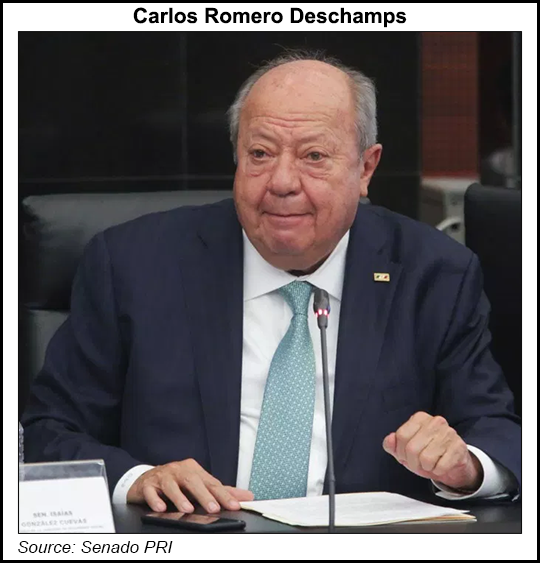High-Roller Mexico Union Boss Poses Potential Quandary for Pemex
Carlos Romero Deschamps, who has led the trade union of indebted state-owned Petroleos Mexicanos (Pemex) for nearly three decades, could potentially hinder efforts to return the oil and gas producer to its glory days if swirling rumors of corruption and nepotism against him are true, analysts warn.

Romero Deschamps, union boss of Sindicato de Trabajadores Petroleros de la República Mexicana (STPRM), is not a business rival of Mexico tycoons like Carlos Slim and the silver billionaire Alberto Bailleres. However, he is quite powerful. Now 75, Romero Deschamps was re-elected in late 2017 for another six-year term.
His life — and that of his family — is reportedly one of luxury. His daughter’s social network posting of a trip to Europe by private plane with her three pet dogs caused a sensation in Mexico newspapers. There have been plenty of other reports, captured by the press and never denied, including luxury apartment holdings in Miami and Cancun, and a yacht said to be valued at $3 million.
The timespan of Romero Deschamp as head of the union contrasts with that of the Pemex director-generals with whom he has grappled over the negotiating table across the years. Most of them have been lucky to last for three years at best; during the recent 2012-2018 administration, Pemex had three successive director-generals.
Dissidents within the union have alleged for years that members of the extended Romero Deschamps family have grabbed dozens of jobs in Pemex despite rules that prevent nepotism in the government service.
More serious accusations, such as electoral fraud and money laundering, have been alleged. In addition to leading the union, Romero Deschamps was until recently also a senator, one of several chosen by proportional representation and therefore having no constituency duties. There appears to be no record of Romero Deschamps ever having spoken in a Senate debate.
Late last week, lawyers for Romero Deschamps were reported by the daily Reforma to have sought an amparo, a “search” injunction to determine if he is under official scrutiny and whether any judicial action is expected against him.
The official answer is no, President Lopez Obrador said last Friday during a press conference. He said he had no knowledge of any accusation against Romero Deschamps. However, “there are rumors everywhere.”
Earlier this month, Romero Deschamps took out full-page advertisements in leading newspapers vouching for his commitment to the government’s cause against gasoline trafficking. The ads described the clampdown as “valiant measures that are attempting to stamp out corruption.”
That view appears to coincide with a majority of public opinion. Polls by three leading newspapers and Consulta Mitofsky, a well-known pollster, indicate that comfortably more than half of those polled support measures, such as the closure of pipelines, that many analysts regard as counter-productive.
Romero Deschamps is a stalwart of the Partido Revolucionario Institucional, or PRI, which ruled Mexico though a unique one-party system for most of last century. Control of the labor movement was a key element of the PRI regime, as consultant Luis Miguel Labardini explained to NGI’s Mexico Gas Price Index. The partner in Marcos y Asociados in Mexico City said the “democratization” that began in 2000 with the defeat of the PRI in a fair and free election did not extend to the labor movement.
“That system gave union bosses unlimited and totally confidential access to government and other funds in return for ensuring peace at the workplace. Nobody will ever know how much Romero Deschamps and several other labor leaders have earned through the system,” he said.
The unionized workforce was largely content because its earnings, as well as terms and conditions continue to be almost invariably better than those of the “informal” sector, which accounts for about 40%.
A change in the leadership of the STPRM is not without precedent, however. Almost 30 years ago, predecessor Pemex union chief Joaquin “La Quina” Hernandez Galicia was arrested by the army after bazooka-wielding troops blasted open the door of his home in Ciudad Madero. The arrest of the La Quina, who was generally regarded as notoriously corrupt, proved to be highly popular as a measure in which the nation’s then new president Carlos Salinas stamped his authority.
Indeed, new Mexican presidents have, over the years, been keen to exert their authority, just as Lopez Obrador is doing now in his controversial campaign to stamp out fuel theft.
Certainly, a change in the current Pemex union leadership could be positive, not only for the union workers but also for potential partners in joint ventures within the foreign and national private sector under the framework of the 2013-14 energy reform, said Labardini.

“Modern international labor practices would include higher wages and better conditions for workers,” he said. “And that could be a quid pro quo in terms of productivity, which is frankly abysmal at several levels.” But the change in the union leadership, as the last three decades under Romero Deschamps has shown, could equally provide only more of the same.
Lopez Obrador has promised radical change in the union movement. In December he said, “The problems in the unions are going to go away because there’s going to be union democracy. There won’t be any more unions that are supported and/or backed by the government, Now there’s going to be leaders appointed by democratic elections of the workers — secret ballots and a free vote.”
Not everyone, however, is convinced by these words. Mexico City-based Mercury analyst Arturo Carranza said. “There’s already been one secret ballot in the SPTRM and it overwhelmingly favored the current leadership.” At least in the Pemex union, a modern labor movement will take time to emerge, he said.
© 2024 Natural Gas Intelligence. All rights reserved.
ISSN © 2577-9877 | ISSN © 2577-9966 |
